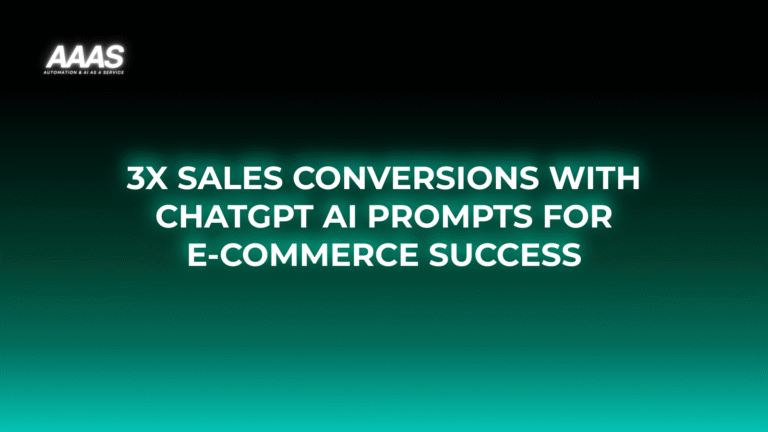Best Practices: ChatGPT Business Prompts for SaaS Companies

Identifying the Customer Support Challenge in SaaS
SaaS companies often struggle with high volumes of repetitive customer inquiries, long resolution times, and resource constraints during rapid growth phases. Traditional support workflows depend heavily on human agents, leading to:
- Slow response and resolution times
- Inconsistent service quality
- Challenges scaling support with user growth
- Increased operational costs
According to Gartner research, faster, more reliable support is now a key factor in SaaS customer retention.
AI-Driven Chat Automation: Solution and Benefits
Integrating ChatGPT-powered business prompts enables SaaS companies to:
- Automate answers to common questions 24/7
- Streamline tier-one support for faster triage
- Gather, verify, and update user data instantly
- Scale support operations without increasing headcount
- Promote self-service for routine issues, freeing agents for complex tasks
Key Benefits:
- Faster average response and resolution times
- Reduced operational costs
- Increased customer satisfaction (CSAT & NPS)
- Consistent and accurate responses
Real-World Use Cases in SaaS
1. Automated Onboarding Support
ChatGPT can guide new users through setup, deliver personalized resource links, and automate profile configurations.
2. Subscription/Billing Queries
Instantly answer subscription plan, invoicing, or upgrade questions using contextual business prompts.
3. Troubleshooting and FAQ Resolution
Identify issues, match solutions from a dynamic knowledge base, and escalate advanced problems to human agents only when needed.
4. Lead Qualification Chatbots
AI chat can qualify leads before routing sales-ready contacts to team members—boosting pipeline efficiency.
See additional SaaS automation use cases at [InternalLink:saas-automation-best-practices|SaaS Automation Best Practices].
Technical Implementation Details
- API or Plugin Integration: Use the OpenAI API or pre-built SaaS plugins to connect ChatGPT to your support platform (e.g., Intercom, Zendesk).
- Prompt Engineering: Design structured prompts with clear context, role instructions, and knowledge base references to maximize relevance and accuracy.
- Workflow Automation: Auto-route conversations based on topic, sentiment, or user segment using webhooks or no-code workflow tools.
- Security & Privacy: Configure data masking and ensure compliance with GDPR, PCI, and SOC-2 for SaaS environments.
- Analytics: Track KPIs: first response time, average handle time, cost per ticket, and CSAT.
Comparison: AI Chat vs. Conventional Workflows
| Feature | Traditional Human Support | AI-Powered Chat Automation |
|---|---|---|
| Availability | Business hours only | 24/7 instant responses |
| Scalability | Requires hiring/training | Scales instantly with demand |
| Response Time | Minutes to hours | Seconds |
| Consistency | Varies by agent | Always consistent |
| Cost | High (labor-intensive) | Lower (automation) |
ChatGPT SaaS Support – Pricing Table
| Provider | Monthly Cost | Automation Features | Notes |
|---|---|---|---|
| OpenAI ChatGPT API | From $20 | Custom prompts, multi-language, workflow APIs | Usage-based pricing |
| Intercom Fin AI Agent | From $39 | Built-in SaaS integrations, analytics | Includes agent handoff |
| Zendesk AI Chat | From $25 | Ticketing automation, intent recognition | Requires Zendesk account |
For current pricing, visit OpenAI pricing.
ROI-Focused Practical Examples
-
Case: SaaS Project Management Tool
By deploying ChatGPT prompts for onboarding and support, monthly ticket volume handled by AI increased by 70%, reducing first response time from 15 minutes to under 60 seconds, and saving $5,000/month in support costs. -
Case: B2B SaaS Analytics Platform
Automated billing queries led to a 30% reduction in agent workload, improved CSAT scores from 82% to 93%, and supported scaling to 10,000+ users without growing support headcount.
Setup Steps: Integrating ChatGPT in SaaS Support
- Define top support scenarios (onboarding, billing, troubleshooting).
- Map current workflows & identify high-frequency queries.
- Design business prompts tailored to SaaS products and brand voice.
- Integrate ChatGPT via API or SaaS-specific plugin to your help desk/chat platform.
- Configure fallback/escalation to human agents for high-priority cases.
- Enable compliance/security measures (data masking, audits).
- Monitor analytics and iteratively refine prompts and workflows.
Pros & Cons of ChatGPT Automation for SaaS
| Pros | Cons |
|---|---|
|
|
Expert Tips for Maximum Value
- Regularly update prompt templates based on new FAQs and user patterns.
- Integrate with CRM and knowledge base for personalization.
- Set up robust alerting for negative sentiment or unresolved cases.
- Continuously A/B test prompt phrasing and escalation rules.
- Monitor compliance with SaaS security standards at every update.
Frequently Asked Questions
- How secure is ChatGPT for SaaS support?
- With proper API configuration, encryption, and data masking, ChatGPT integrations can comply with GDPR, SOC-2, and industry standards.
- Will AI bots replace support agents?
- AI chat automates repetitive tasks, but human agents remain essential for complex or sensitive issues. The best SaaS teams use both in tandem.
- How can I measure the impact of chat automation?
- Track KPIs such as average response time, tickets resolved by AI, cost per interaction, and CSAT/NPS.
- What SaaS platforms integrate with ChatGPT?
- Popular platforms include Intercom, Zendesk, Freshdesk, and HubSpot, each supporting API or chatbot plugin integration.
References & Citations
- Gartner – Trends Driving Customer Service in 2024
- OpenAI – Language Model Research
- Intercom: Automated Customer Support
- Zendesk: How AI Changes Customer Experience
- McKinsey: The Value of Customer Experience Quantified
Last updated: 2025-06-25T09:01:32.198Z








